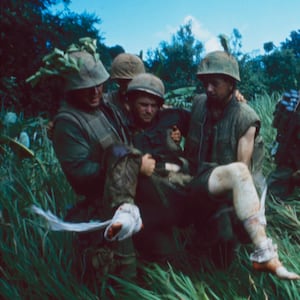No American president—no chief executive of a Western democratic country—has displayed so much open disdain for the professional intelligence services of his own government as Donald J. Trump. He’s repeatedly disparaged authoritative CIA analyses that concluded Russia meddled with the 2016 election. He ignores his own intelligence officials’ assessments of the dangers of global warming. Just last month, when Director of National Intelligence Dan Coats told Congress that North Korea shows no signs of dismantling its nukes, and that the Iran nuclear deal was working just fine, Trump struck back, just as he always does when reality intrudes on his dream world. “The intelligence people seem to be extremely passive when it comes to the dangers of Iran,” he tweeted. “They are wrong... Perhaps the intelligence people should go back to school.”
Trump’s inclination to attack those who bring unwelcome news to his doorstep is but one of many reasons he gives the entire American foreign policy establishment heartburn, and worse.
But Trump is by no means the first president to dismiss sound intelligence assessments when they challenged the viability of a given policy. Eisenhower, Kennedy, and LBJ never questioned the professionalism of the CIA or the other intelligence services, at least not in public. Nonetheless, all three men dismissed the CIA’s pessimistic assessments of America’s crusade in Vietnam and plunged deeper and deeper into a civil war that blossomed into a great tragedy for Americans and Vietnamese alike.
There was nothing impulsive about the series of decisions that committed the United States to fighting a major war in Vietnam, and then prolonged America’s commitment to winning that conflict, even as signs of failure began to accumulate like buzzards around a corpse. Between 1950 and the summer of 1965, three U.S. presidents opted to expand America's involvement in Vietnam, despite that ancient Asian country's seeming irrelevance to American vital interests, and the extraordinary level of dysfunction and corruption among America’s Vietnamese allies.
By late 1967, with half a million American troops in Vietnam, the Army’s field commander was predicting imminent defeat of the enemy. There was “light at the end of the tunnel,” a confident William Westmoreland told Congress. The communists were “on the ropes.” Then, on January 31 Hanoi launched the massive Tet Offensive, exposing the delusions and distortions of Westmoreland’s assessment and breaking America’s political will to carry on the fight.
Perhaps the most startling thing I've come to understand after more than a year of investigating these decisions is that they were made despite a steady, consistent flow of CIA reports indicating that the American rationale for defending South Vietnam was deeply flawed, and that the civil war there could never be won by the force of American arms. Even when the war was in full swing in 1966, the CIA’s analysts continued to express deep skepticism over the sunny reports issued by the White House and the U.S. military command, challenging their rosy assessments of the communists’ order of battle, and the effect of U.S. military operations on the enemy’s capacity to persist in the fight.
Had America's presidents heeded the early CIA reports, there never would have been an American war in Indochina. Had President Johnson heeded the latter ones, he would have drawn down America’s forces and negotiated a political settlement to the conflict long before 1968.
Perhaps half a million lives would have been saved. But it was not to be.
The CIA analysts consistently argued that American policymakers, in looking at Vietnam's civil war through the lens of cold war anti-communism, were distorting the realities of the war on the ground and misunderstanding the political dynamics at play in the Vietnamese countryside. The communists, they argued, were well organized and deeply committed—quite unlike pro-Western Vietnamese politicians and military commanders, who were notoriously fractious and corrupt. Here's an excerpt from a 1950 CIA Intelligence Memorandum:
The Vietnamese insurgents are predominantly nationalists rather than communists, but Communist leadership is firmly established... These insurgents have long controlled most of the interior of Vietnam. Before 1954, they will probably have gained control of most, if not all, of Indochina.
In 1952, the CIA got it right again when it predicted communist victory in the war against the French colonialists:
The longer-term outlook is for continued improvement in the combat effectiveness of the Viet Minh… Unless present trends are reversed, this growing pressure, coupled with the difficulties which France may continue to face in supporting major military efforts in both Europe and Indochina, may lead to an eventual French withdrawal from Vietnam.
And so it did.
In 1962, just as John F. Kennedy approved a substantial increase in American military advisers and military equipment, including helicopters piloted by Marines, the CIA proffered this cautionary advice:
The real threat, and the heart of the battle, is in the villages and jungles of Vietnam… that battle can be won only by the will, energy, and political acumen of the resisting government itself. U.S. power can supplement and enlarge their power, but it cannot be substituted. Even if the U.S. could defeat the Communists militarily… the odds are that what it would win would be, not a political victory which created a stable and independent government, but an uneasy and costly colony.
This theme was a constant refrain in the CIA literature from 1962 until well after the United States committed itself to full-scale war three years later.
While American policymakers in the Kennedy and Johnson administrations continued to justify America's involvement in Vietnam as a proper response to "wars of national liberation" run by the Kremlin and Beijing, the CIA consistently pointed out that this was simply not the case. Hanoi ran its own show, deftly playing off one communist superpower against the other, and frequently decided to go its own way in the prosecution of the war effort against the Americans.
According to the leading historians of Hanoi’s war today, the CIA assessments were spot on.
The Agency's doubts about the trajectory of American policy in the war were especially pronounced during late 1964 and early 1965, when the Johnson administration truly crossed the Rubicon by implementing a gradually increasing bombing campaign over the North and deployed American combat units to take the fight to the enemy in the South. In effect, Johnson took over management of the war from the South Vietnamese and put in the hands of his own generals. Here is an astonishingly prescient assessment by CIA analyst Harold P. Ford, written in April 1965, just as LBJ was committing American Marines to offensive operations for the first time:
This troubled essay proceeds from a deep concern that we are becoming progressively divorced from reality in Vietnam, that we are proceeding with far more courage than wisdom—toward unknown ends… There seems to be a congenital American disposition to underestimate Asian enemies. We are doing so now. We cannot afford so precious a luxury. Earlier, dispassionate estimates, war games, and the like, told us that [the communists in Vietnam] would persist in the face of such pressures as we are no exerting on them. Yet we now seem to expect them to come running to the conference table, ready to talk… The chances are considerably better than even that the United States will in the end have to disengage from Vietnam, and do so considerably short of our present objectives.
Johnson ignored Mr. Ford's sage advice. Within weeks of receiving this report, he approved General Westmoreland's three-phase plan to win the war by 1968 through a strategy of attrition. Using as many as half a million U.S. troops, he would destroy the enemy's main forces with massive "search and destroy" sweeps, using American mobility and firepower to vanquish an enemy without any air power whatsoever, and little motorized transport. Westmoreland would pay lip service to the CIA's belief that the war had to be fought and won in the villages, but he’d fight and win in the traditional American way: conventional warfare, emphasizing air power and artillery, despite the fact that American military operations inflicted massive destruction on the people America had come to South Vietnam to "save."
Why did America's policy makers dismiss the astute counsel of the CIA’s wise men? The short answer is that they couldn't break free of the domino theory—the false notion that if one state fell to communism, a string of others was sure to follow, and that this would lead to an irreversible loss of credibility and prestige for the United States.
Arrogance played an outsized role in the decision-making. As Harold Ford put it long after the guns fell silent: "There was a profound hubris among top policymakers. They believed their made-in-America schemes would work in Vietnam, where similar schemes by the French had not. We would succeed because of our superior firepower."
Yet when all is said and done, much of the burden of responsibility for America's ill-advised war in Southeast Asia falls on the shoulders of Lyndon Johnson, who did not want to fight in Vietnam, but felt he had to do so to prevent his critics from calling him soft on communism, and to stave off personal humiliation and political defeat. Johnson described a recurring dream, in which he sensed that if he faltered on the war, "there would be Robert Kennedy out in front leading the fight against me, telling everyone that I'd betrayed John Kennedy's commitment to South Vietnam. That I was a coward. An unmanly man. A man without a spine... In the distance I could hear the voices of thousands of people. They were all shouting and running toward me: "Coward! Traitor! Weakling!"
LBJ simply couldn't bear to hear that we couldn't win in Vietnam. And so, when the CIA said as much, he closed his ears.
One of the most subtle and wise of the CIA analysts, George W. Allen, puts it well: "America failed in Vietnam not because intelligence was lacking, or wrong, but because it was not in accord with what its consumers [i.e., Ike, Kennedy, Johnson, and their chief advisers] wanted to believe, and because its relevance was outweighed by other factors in the minds of those who made national security policy decisions."







